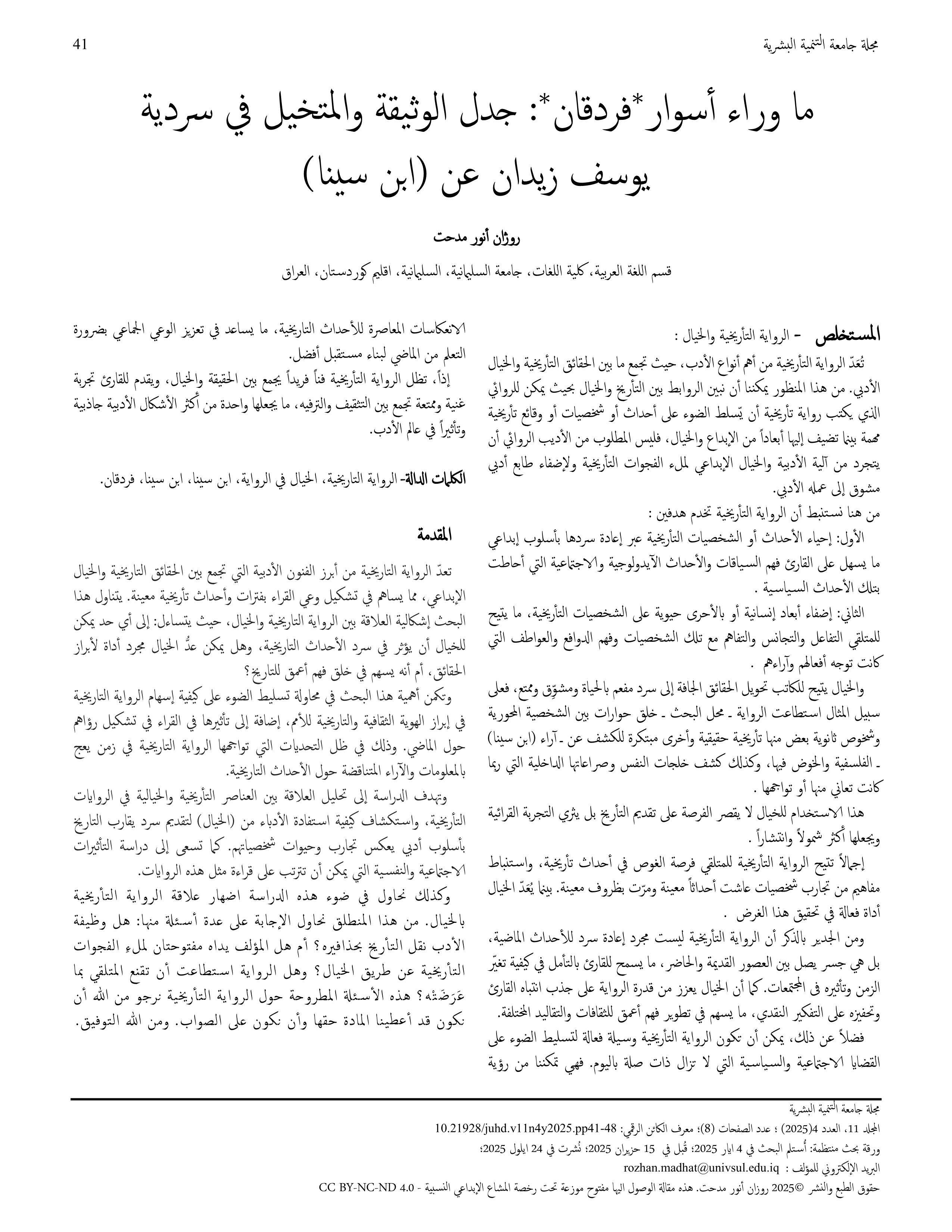Beyond the Walls of “Fardeqan”: The Dialectic of Document and Imagination in Yossef Ziedans Narrative of ibn Sina.
DOI:
https://doi.org/10.21928/juhd.v11n4y2025.pp41-48Keywords:
Historical Novel, Fiction in the Novel, Ibn Sina, *Avicenna*, FardeqanAbstract
The Historical Novel and Imagination
The historical novel is considered one of the most important literary genres, combining historical facts with literary imagination. From this perspective, we can illustrate the links between history and imagination, whereby a novelist writing a historical novel can highlight significant historical events, figures, or facts while adding dimensions of creativity and imagination. The literary novelist is not required to divest themselves of literary mechanisms and creative imagination to fill historical gaps and to add an engaging literary character to their work.
From this, we deduce that the historical novel serves two purposes:
First: Reviving historical events or figures by retelling them creatively, making it easier for the reader to understand the ideological and social contexts surrounding those political events.
Second: Adding human dimensions, or rather vitality, to historical figures, allowing the recipient to interact, empathize, and understand these characters, comprehending the motives and emotions that guided their actions and opinions.
Imagination allows the writer to transform dry facts into a vibrant, engaging, and enjoyable narrative. For example, the novel under discussion was able to create dialogues between the central character and secondary characters—some historical and real, others invented—to reveal and delve into the philosophical views of (Ibn Sina), as well as to uncover the inner turmoil and conflicts he might have suffered or faced.
This use of imagination does not limit the opportunity to present history but enriches the reading experience, making it more comprehensive and widespread.
In summary, the historical novel offers the recipient the chance to delve into historical events and derive concepts from the experiences of characters who lived through specific events and circumstances. Imagination is considered an effective tool in achieving this purpose.
It is worth noting that the historical novel is not merely a retelling of past events, but a bridge connecting ancient times with the present, allowing the reader to reflect on how time changes and affects societies. Imagination also enhances the novel's ability to capture the reader's attention and stimulate critical thinking, contributing to a deeper understanding of different cultures and traditions.
Furthermore, the historical novel can be an effective means of highlighting social and political issues that remain relevant today. It enables us to see contemporary reflections of historical events, helping to foster collective awareness of the need to learn from the past to build a better future.
Thus, the historical novel remains a unique art form that combines truth and imagination, offering the reader a rich and enjoyable experience that blends education and entertainment, making it one of the most attractive and influential literary forms in the world of literature.
References
اللغة العربية
أبو الديب، كمال، 1984، جدلية الخفاء والتجلي، الطبعة الثالثة، دار العلم للملايين، بيروت.
بن سينا، أبو علي الحسين بن عبد الله .1363، المبدأ والمعاد، مؤسسة مطالعات اسلامي، طهران.
سركيس، احسان، 1979. الثنائية في ألف ليلة وليلة، دار الطليعة للطباعة والنشر، بيروت.
طاليس، أرسطو، 2009. السياسة، ت: أحمد لطفي السيد، الجمل، بيروت.
لوكاش، جورج، 1986. الرواية التأريخية، ت: صالح جواد الكاظم، دار الشؤن الثقافية، الطبعة الثانية، بغداد.
سيد هاشم، رضا، 2016. (ابن سينا) ومنهجه في التربية والأخلاق، كلية دار العلوم جامعة القاهرة، القاهرة.
بن فوزان، صالح، 1412. الاجتهاد، دار المسلم، الرياض.
الشرفي، عبد المجيد السوسه، 1418. الاجتهاد الجماعي في التشريع الاسلامي.
مرتاض، عبد الملك، 1998. في نظرية الرواية، عالم المعرفة، الكويت.
الجروستاني، عبد الوهاب عبد الله ،2009. شعر التصوف بين الأدبين العربي والكردي (دراسة مقارنة)، مديرية الطباعة والنشر وزارة الثقافة، السليمانية.
القاضي، محمد، 2008. الرواية والتأريخ، دار المعرفة للنشر، تونس.
القاضي، محمد، 2010. معجم السرديات، دار محمد علي للنشر، تونس.
زيدان، يوسف، فردقان: (اعتقال الشيخ الرئيس). 2018، دار الشروق، القاهرة.
المصادر باللغة الإنكليزية:
Oliver Leaman, 2001, Encyclopaedia of Asian Philosophy, Routledge, London.
Peter Groff, 2007, Islamic Philosophy A-Z, Edinburgh University Press, Edinburgh.
الدوريات:
ضرغام، عادل، الرواية وحوار التأريخ،16-2-2010، جريدة الحياة، الثلاثاء.
adeldrgham.blogspot.com/2010/02/blog-post.html

Downloads
Published
How to Cite
Issue
Section
License
Copyright (c) 2025 Rozhan Anwar Madhat

This work is licensed under a Creative Commons Attribution-NonCommercial-NoDerivatives 4.0 International License.


